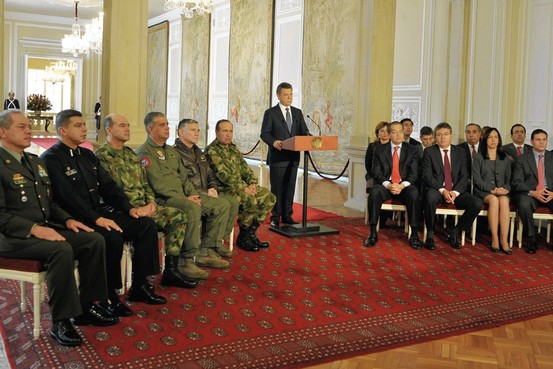Colombian Government and FARC Talk Peace in Cuba

On Wednesday, the Colombian government and FARC (Revolutionary Armed Forces of Colombia) returned to the negotiating table in Cuba after a week-long break, during which 20 guerrilla fighters were killed in a bombing by the Colombian army near the Ecuadorian border. Ten years after the last peace talks failed, the two parties are moving forward with negotiations that could potentially end a conflict that has lasted nearly five decades, killed several hundred thousand people, and displaced several million others.
An informal dialogue between Colombian officials and the guerrilla group started soon after President Juan Manuel Santos took office in 2010. Hugo Chavez, the president of Venuzuela, Fidel Castro, and the International Committee of the Red Cross, intervened to lay down the ground work for a more official peace process.
The first round of negotiations was held in Oslo, Norway in late October, after some delays incurred by the need to lift international warrants on the delegates of the FARC, which is considered a terrorist organization by the US, the EU and other countries. The talks will continue this week in Cuba and last for a few months before discussions take place in Colombia. The negotiations will remain secret for the most part, to preserve chances of a favorable outcome.
The dialogue between the two camps will be centered around 5 main topics: rural development; the transition of the FARC into a political party; the end of the conflict (an option considered by the FARC for the first time); the production of drugs (Colombia being the first producer of cocaine in the world); and the rights of victims of the conflict.
The core of the negotiations is the modernization of the Colombian agricultural system. Colombia has one of the world's most unequal land distribution, with less than 1.15% population owning 52% of the land, an issue which sparked the FARC-led revolution in 1964.
Since 1985, more than 6.5 million hectares of land have been usurped, stolen, or abandoned because of the conflict. 70 percent of the rural population lives in poverty and has limited access to roads, schools and hospitals. The resolution of such socioeconomic disparity is particularly important to the Marxist FARC. The guerrillas, supported by the left wing political parties on this issue, advocate for a small and medium, but technically advanced, peasantry. The government, on the other hand, dreams of transforming the east of the country into a breadbasket of agriculture export to South America and strongly favors the status quo of the agro-industry complex.
The production of cocaine, which has become a major part of the FARC's funding, as well as stolen livestock and extortion, will need to be addressed to attain any lasting peace. Drug trafficking is vital for the survival of the FARC and other paramilitary groups operating in the region. According to Antonio Navarro Wolff, former guerrillero-turned-politician, the government "will have to take control of the coca leaf plantations that are currently owned by the FARC, because if not another criminal group will take it over.”
The circumstances surrounding the talks suggests that these negotiations could lead to a more productive and long lasting result than in the past. When the Del Caguan peace process commenced in 1998, led by former President Andres Pastrana, the FARC was enjoying the peak of their power and controlled a territory the size of Switzerland with an army of more than 20,000 men. In 2012, after 8 years of fierce anti-FARC policy enforced by former President Uribe, including the deaths of many historical members of the organization, the FARC has been weakened.
The oldest remaining guerrilla group in South America, the FARC currently boasts 9,000 members. However, they have suggested that they could be ready to lay down their weapons, the statement alone of which is a historical step. The guerrilla movement has also reached the point at which they will need to greatly improve their violent reputation if they ever want to be involved in Colombian politics. Currently, they do not receive much popular support in the country. The present two month cease-fire highlights the FARC's good will heading into the peace talks.
Last weekend, President Juan Manuel Santos set a deadline for the end of negotiations, saying peace talks should be finished by November 2013. The FARC said that they would stay at the negotiating table as long as necessary.




